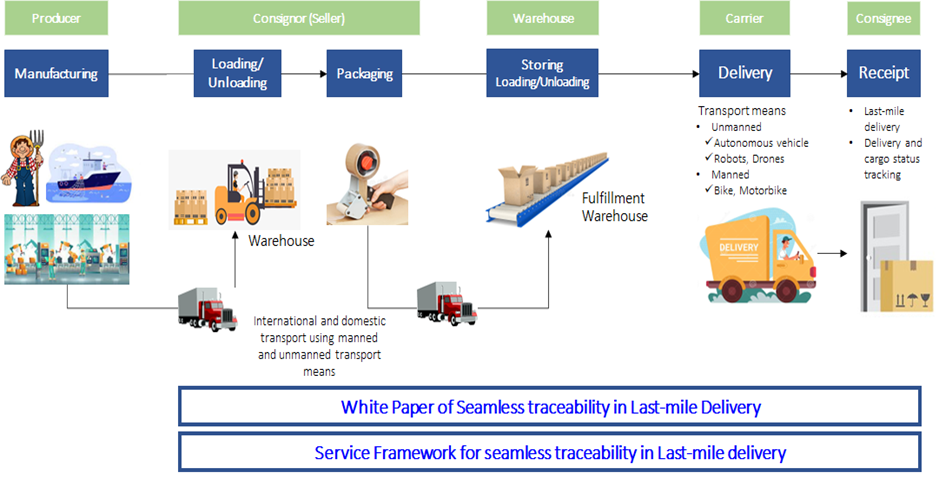Parcel goods traceability in last-mile delivery
otherProject Details
Project Purpose
With the development of the 4th Industrial Revolution technologies, the logistics industry is aiming at automation and unmanned processes and has been introduced to emerging technologies for this purpose.
Furthermore, as spreading the non-contact environment after the COVID-19 pandemic, the transition to non-contact services in the logistics industry has been accelerating. In addition, the transaction environment such as unmanned stores and online transactions is diversified, and unmanned transportation means are introduced to last-mile delivery due to the development of the 4th Industrial Revolution technologies, so many changes are appearing from the existing delivery environment in the logistics industry.
Unmanned transportation means, such as robots and drones, have been introduced as a new last-mile delivery method, and operations for unmanned stores have spread. In the existing logistics environment, parcel goods tracking, and status monitoring was based on exchanged data between logistics participants, requirements in the current and future logistics environment may be diversifying as follows;
- Diversification of objects that generate logistics data: autonomous vehicles, IoT devices, delivery robots, drones, etc.
- Expansion of unmanned logistics facilities: It is necessary to monitor facilities and operation conditions in facilities operated without human intervention, such as unmanned stores, unmanned warehouses, etc.
- Expansion of scope of tracking for delivery: Due to the activation of last-mile delivery, expand the service scope to include delivery to end customers.
- Support for omnichannel operation method: Inventory management and distribution management are needed to improve the quality of logistics services both online and offline with the emergence of logistics entities that simultaneously operate both online and offline.
So, it is necessary to consider how to adapt monitoring and parcel goods tracking approaches from the current logistics environment to the altered logistics environment for a seamless supply chain. Under the present and future supply chain environment, requirements from stakeholders and users are becoming more diverse; monitoring cargo status for fresh foods, agriculture products, etc., monitoring of unmanned stores, checking delivery status between warehouses and stores in the case of Ommi channels, and linkage between autonomous last-mile transport means, etc.
Project Scope
To address these requirements, the project suggests this proposal about efficient seamless traceability in the supply chain that is for parcel goods delivery using both manned and unmanned vehicles and seamless parcel goods tracking to achieve the following objectives.
- Accuracy: Maintaining information accuracy and transparency throughout the entire supply chain, from producers to distribution centers, warehouses, stores, transport means, and customers until parcel goods reach the final consumer
- Reliability: To ensure seamless parcel goods tracking in delivery, the establishment of tracking data management of discontinuous delivery stages or between participating entities (distribution center, warehouse, store, end consumer, unmanned transport means, etc.)
Diversity: Service framework for seamless traceability that will support flexibility to support various supply chain environments; manned/unmanned stores, manned/unmanned warehouses, transport means for last-mile delivery, autonomous vehicles, mobile depot, etc.
The project scope is to define and create white papers on the best practices in implementing service framework for seamless traceability in last-mile delivery with a view to examining:
- Design Service framework required for seamless traceability in last-maile delivery
- Design interface and message standard to exchange information between human (manned transport means) and machine (unmanned transport means)
- How the existing UN/CEFACT deliverables could be used by the service framework for seamless traceability
New deliverables, that could be considered to support the service framework for seamless traceability-based trade-facilitation-related applications.
Project Deliverables
Deliverable 1: BRS and eBusiness Standard for Parcel Goods waybil
Deliverable 2: BRS and eBusiness Standard for Parcel Goods delivery receipt
Deliverable 3: Whitepaper on Parcel Goods Traceability in last-mile delivery
Exit Criteria
Deliv. 1: BRS and eBusiness Standard
Deliv. 2: BRS and eBusiness Standard
Deliv. 3: Draft whitepaper ready for publication
Project Team Membership and Required Functional Expertise
Membership is open to UN/CEFACT experts with broad knowledge in the area related to advanced technologies, supply chain and logistics, such as from supplier and consumer, carrier, warehouses, terminals, etc. In-depth knowledge of UN sustainable development goals.
In addition, Heads of Delegations may invite technical experts from their constituency to participate in the work.
Experts are expected to contribute to the work based solely on their expertise and to comply with the UN/CEFACT Code of Conduct and Ethics and the policy on Intellectual Property Rights
Geographical Focus
Global
Initial Contributions
The following contributions are submitted as part of this proposal. It is understood that these contributions are only for consideration by the Project Team and that other participants may submit additional contributions in order to ensure that as much information as possible is obtained from those with expertise and material interest in the project. It is also understood that the Project Team may choose to adopt one or more of these contributions “as is”.
Initial contributions include existing descriptions and technical specifications for the UN/CEFACT:
- UN/CEFACT Core Component Library and subset data models Supply Chain Reference Data Model (SCRDM) and the Multi-Modal Transport Reference Data Model (MMT-RDM)
- Cargo tracing and tracking BRS
- Internet of Things(IoT) for Trade Facilitation
- Artificial Intelligence(AI) for Trade Facilitation
- Verifiable Credentials(VC) for Trade Facilitation
Resource Requirements
Participants in the project shall provide resources for their own participation. The existence and functioning of the project shall not require any additional resources from the UNECE secretariat.
Project Proposal Files


